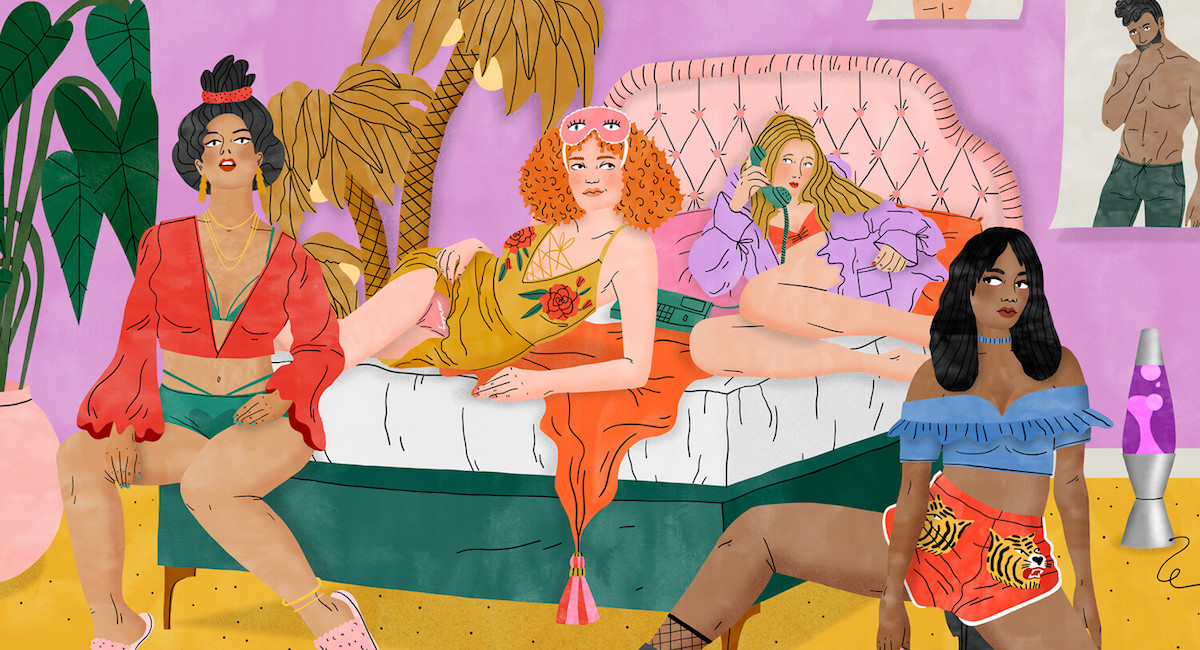The Poetry of Periods
Lucille Clifton’s “poem in praise of menstruation” is one of the most prominently read poems about periods. It is a tumbling, fragmented column that builds toward a calmly stated desire—let the beauty of menstruation spread, as it is nearly impossible that there is anything as passionate and alive as its bloodied pastures.
Why was the body made? How does it torture? People of all genders with uteri are reminded on a monthly, and sometimes entirely unpredictable, basis that our bodies contain a world of pain.
Poetry has always been about the body, and has always sprung forth in particularly explosive ways from bodies that remain scrutinized and objectified on a public and personal scale. As blood stains our jeans and our bedsheets, menstruation can easily flower into an eerie metaphor: the internal plane of existence that we can suddenly see externally expressed. No wonder so many of us end up as writers.
I was fifteen when my uterus cramped so deeply at school that I turned pale and had to be walked to the nurse’s office, where I fell onto one of their little plastic cots and held myself, dizzy and light-headed. I heard the two nurses talking. “Is it menstrual?” one asked the other. I remember loving her in that moment, loving that she knew without being told. I remember sneaking tampons from the front pocket of my backpack up my sleeve when I left to go to the bathroom so that no one saw. It was not so different from the way I snuck poems into the margins of my notebook and went to great lengths to be sure that no one ever saw them.
Despite the constant silence and hidden nature of periods, not all of us are afraid of our blood when we are alone with it—after all, we have to touch it, smell it, wring it from our clothing in the bathroom sink. I was someone new upon getting my first period, and it had nothing to do with becoming a “woman” (whatever that means) and everything to do with the tireless rituals I realized would follow me for as long as I menstruated: the salty smell of blood and girlish insides, that color scheme of reds and how they become perpetual signals of the state of the body, a coded language. Darkest, I learned, meant the lining had been there longer. Lighter, newer. Crimson would never be the same.
Cold water gets the stains out best, my mother taught me. You have to rinse the fabric as soon as you notice you’ve bled through. In the winter, the water from the faucet would be so cold that it made my hands go numb. And yet I pressed on through each step: let the fabric become water-logged, then twist the garment hard and watch the blood exit, getting progressively clearer until it runs blank. Sometimes, I’d think I’d gotten it all, but upon another try, fresh red rivers slipped out. The amount of times I’ve completed these rituals must be in the thousands.
And so the cyclical, ritualistic nature of the period remains inherently poetic, following a rhyme scheme equal parts wild and steady, pushing the body onward and inward. It propels the menstruating person toward themselves with abandon—are you going to have a child? You can, you know. You forgot to. Are you still breathing? What are you waiting for?
These reminders make menstruating poets profoundly deep thinkers as we collide with our power and are then sweetly punished and loved by our needing bodies as they send us these messages. We are inadvertent participants in a repeated balancing act riddled with questions about purpose, gender, birth, sex, death, and pain. In short, the period can be a reminder to write. It can force us deeper into our obsessions (a gift and a curse). In many ways, the period is a poem. All the signs are there, including a format, repetition, intense color, imagery that changes meaning over time, sensory power, ritual, and questions of time and mortality addressed through what Lucille Clifton describes as “the blood red edge of the moon.”
Like the poem, we wait for the period to come through our bodies—to hit us in the gut and then purge forth. It both does and does not belong to us. It forces eyes to stare, hands to work, brains to jolt. It is disruptive, a scandal. It punctuates and molds time into a soft narrative, just as writing does. It resists heavy control. In fact, it is almost entirely uncontrollable, just like its sister, poetry. It is an experiential transcription of the body’s secrets.
I once sat on my partner’s couch on a particularly red day and stood up to find I’d bled out onto his light gray cushions. I found myself trying desperately to scrub the evidence away and then having to explain when he later asked if I’d spilled coffee by mistake. I spilled myself by mistake, I wanted to say. That phrase could also be an epigraph to everything I’ve ever written.
Illustration by: Jane Bodil.
Recommended
Nor’easter
Post-Op Appointment With My Father
Cedar Valley Youth Poet Laureate | Fall 2024 Workshop






